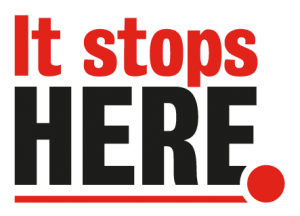As It Stops Here gears up for 2018/19, Diversity & Inclusion Consultant and Project Lead, Nicole Robinson has written a blog on the importance of having an anonymous reporting mechanism as an option for reporting harassment, hate crime or sexual misconduct.
 It Stops Here is a collaborative campaign by King’s College London and KCLSU to build an environment where all our students, staff and community members feel welcome, supported and safe regardless of who they are.
It Stops Here is a collaborative campaign by King’s College London and KCLSU to build an environment where all our students, staff and community members feel welcome, supported and safe regardless of who they are.
The official report from the Universities UK Taskforce examining violence against women, harassment and hate crime affecting university students recommended a centralised reporting system, allowing for anonymity if preferred.
Over the last few years, anonymous reporting has been introduced by several universities nationally, including the University of Manchester, University of Cambridge, and Goldsmiths University of London.
Anonymous reporting is recommended in recognition of widespread international and national underreporting of sexual violence, harassment and hate crime. The Ministry of Justice, Home Office and Office for National statistics estimated in a 2013 report that only 15% of sexual violence cases are reported to the police. (Ministry of Justice, 2013) In 2014, a report from the National Union of Students reported high rates of sexual violence in universities; figures which are not often reflected in institutions formal reporting data. (NUS, 2014)
As part of the It Stops Here project, the Diversity & Inclusion Team created and implemented an online anonymous form which provides individuals the opportunity to share their experience confidentially, without having to speak to someone directly, relive their experience, or go through a formal process.
At King’s, we have chosen to ensure that the form is completely confidential. This means that we ask closed questions and do not collect detailed information such as names, dates and times. This also means that we can’t follow up on or resolve these specific incidents of harassment.
Whilst we cannot respond directly, the form aims to allow King’s to identify trends in types of incidents, and reasons for not using formal reporting methods, to help us see if, and how, initiatives are affecting the levels of harassment in the long term and to help measure the effectiveness of It Stops Here.
For some, simply having a way to let us know something has happened, and that there is a problem, is enough. For others, it may be important to take it further. In both cases, it is likely beneficial to get further emotional support. With anonymous reporting, staff and students at King’s have multiple options when deciding how to respond to incidents, in a way that is right for them.
For more information about reporting options, available internal and external support services and the It Stops Here campaign visit our website.
If you have any questions, you can get in touch with us on diversity@kcl.ac.uk